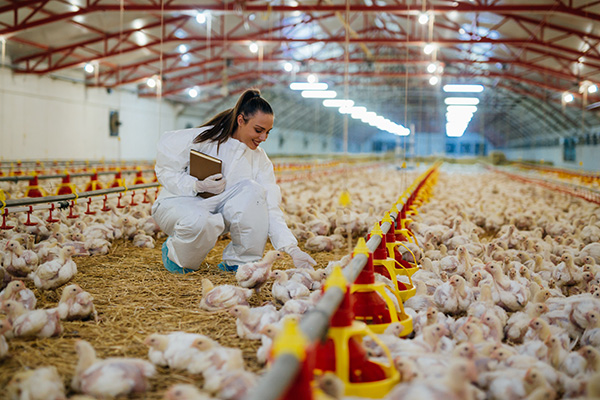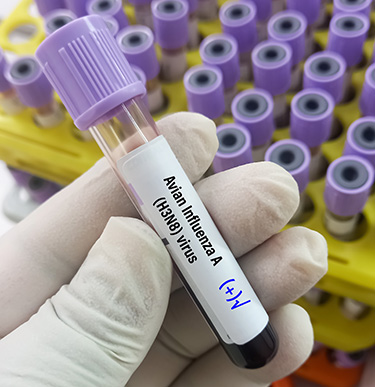Responsibilities
Texas egg and chicken farming families are committed to providing excellent care for their animals and producing safe, nutritious food products for families across the nation, all while using environmentally friendly farming practices.
Ensuring Excellent Care of Our Flocks
Texas poultry farmers take their responsibility as animal caretakers seriously. Texas farmers ensure their flocks are kept safe and healthy by providing:
- Comfortable, temperature-controlled barns for hens to live in that protect them from extreme temperatures and predators
- A 24/7 supply of fresh food and water
- Animal care teams who regularly monitor flocks' health and behaviors

Biosecurity on Texas Poultry Farms
Farmers also implement strict biosecurity measures on their farms to keep diseases away from birds and to prevent them from becoming sick. Biosecurity practices include monitoring flocks for signs of illness; wearing protective clothing and shoe covers; limiting the number of on-farm visitors; keeping feed, water, vehicles and equipment clean; and avoiding contact with wild birds or other poultry, among other items.

Are you a Texas poultry owner? Biosecurity resources are available for Texas poultry farmers through the following links:
- Biosecurity assessment tool: USPOULTRY provides a self-assessment checklist for enhanced biosecurity
- Biosecurity training tools and resources: These biosecurity resources are based off the checklist for self-assessment of implementing poultry biosecurity
- USDA APHIS Defend the Flock Resource Center: USDA provides free resources to help keep poultry healthy and prevent diseases
We encourage all commercial operations that produce poultry indoors to use the self-assessment checklist and these resources to review and improve their biosecurity plans.
National Poultry Improvement Plan
The National Poultry Improvement Plan was established in the early 1930s to provide a cooperative industry, state and federal program focused on improving the nation's poultry flocks to ensure a safe, high-quality product for consumers.
NPIP was initially created to eliminate pullorum disease from commercial poultry flocks, but the program has since expanded to monitor the testing of multiple poultry diseases, including Salmonella typhoid, Salmonella enteritidis, Mycoplasma gallisepticum, Mycoplasma synoviae, Mycoplasma meleagridis, and avian Influenza.
The Texas Poultry Improvement Association is the official state agency administering NPIP in Texas. If you wish to have your flock NPIP certified, please contact Sydney Rosario at PT-Program@tvmdl.tamu.edu . Here is the information for the TVMDL PT Program and NPIP sign up.
If your flock shows signs of illness, act right away! To report sick birds, contact the Texas Animal Health Commission .
The TAHC advises poultry owners to practice strong biosecurity and remain vigilant in examining the health of their birds. If your birds exhibit unusual death loss or signs of illness, or you observe large scale sickness and mortality of wild birds, call your private veterinarian or the TAHC immediately at 1-800-550-8242.
Avian Influenza

Avian influenza continues to be a concern throughout the U.S. Avian influenza is an infectious disease of birds caused by type A strains of the influenza virus. It is believed that avian influenza is transmitted through wild birds and waterfowl - both through direct contact and indirectly if the disease is carried onto a farm by workers, equipment, etc., which is why biosecurity is so important.
The important thing to know is that avian influenza is not a food safety issue or public health risk. Both USDA and CDC agree that you can't get avian influenza from the food you eat, including eggs and poultry bought from the grocery store.
Texas poultry farmers are doing all that is possible to prevent avian influenza from entering their farms. To view the state's avian influenza plan, click here. Current USDA avian influenza information is available here.
